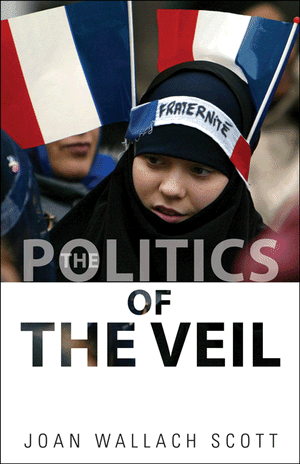 |
| This photo is the cover of Politics of The Veil |
Joan Wallach Scott comes to the conclusion that "rather than resolving the problem of integrating Muslims into French society, the law banning headscarves has exacerbated it." (179) Some think that in order to better integrate Muslims into French society they should abide by the "universal" ways in order to be a united, singular entity. By doing this some French think that women should not be allowed to wear the headscarf. Some that oppose the veil assume that it is a way of oppressing women. While others believe that the veil is a symbol of Islam's resistance to modernity. By bringing so much attention to the controversy of the veil, ultimately the French people have created more of a divergence between the Muslims living there and the French.
Many of those who oppose the veil assume that they are doing the right thing because wearing the veil would oppress the woman who is wearing it. It is discussed that Islam is seen by many to oppress women and that French Republicanism is seen to liberate them. This gives the illusion that by allowing women to wear less clothing, the French are giving them more equality.
Some more of the fears of veil that the French have are that by letting the Islamic community express their culture at school and throughout the country of France, that the French culture and history will diminish. Many French view their country as a "timeless superiority" and do not want to come to terms that the world is changing into an integrated society. Joan Wallach Scott brings to the audience's attention that by bringing so much attention to the differences between the Muslim and the French culture, people have inherently created a huge racist divide between the people. It is interesting that the French consider themselves a universal society and accepting when their enforcement of homogeniety has in fact divided those that live there.
Another point brought up in the reading that children that are forced to remove their veil when they enter the classroom feel as if they are reminded everyday they are not welcome and that they do not fit the mold. Many have said that wearing a headscarf in the French society has been an extreme handicap for them. According to the reading, veiled women have been turned away from employers, being witnesses for the courts, marriage ceremonies, and much more. To me, one of the most interesting things that Scott said in Politics of The Veil is that the "oneness" that is instilled in the French culture is providing exclusiveness rather than inclusiveness. So by bringing so much attention to the fact that Muslims are different by trying to get them to be the same, racism has been created in the French society.
The following video is of Joan Wallach Scott discussing her book and her opinion of the veil in French society. It also discusses the issues of French gender inequality. To learn more about the book and about modern Islamic society please watch this video to be informed.
No comments:
Post a Comment